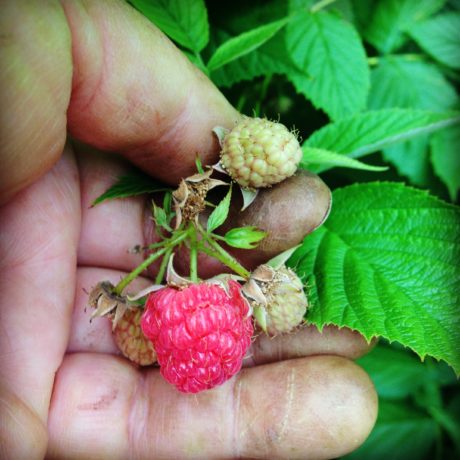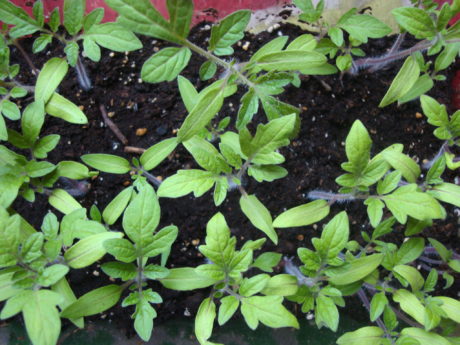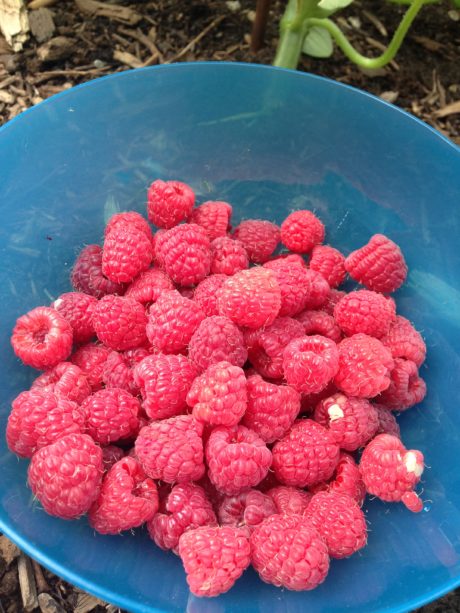 I remember it very clearly. On November 18th I was out in the backyard, revelling in the warm sunshine and picking beautiful red raspberries. I looked around at the garden and saw a nice green patch of kale. There was a wide selection of fresh herbs like thyme, mint, tarragon and sage all ready for snipping. Even the leafy swiss chard was standing tall with its fleshy leaves and brightly coloured stalks. This is crazy, I thought to myself. Usually a hard frost has taken all of my plants down by now (well, maybe not the kale—it’s pretty tough). I regret taking out the tomato plants in September—they might still be growing in this weird and wonderful fall season!
I remember it very clearly. On November 18th I was out in the backyard, revelling in the warm sunshine and picking beautiful red raspberries. I looked around at the garden and saw a nice green patch of kale. There was a wide selection of fresh herbs like thyme, mint, tarragon and sage all ready for snipping. Even the leafy swiss chard was standing tall with its fleshy leaves and brightly coloured stalks. This is crazy, I thought to myself. Usually a hard frost has taken all of my plants down by now (well, maybe not the kale—it’s pretty tough). I regret taking out the tomato plants in September—they might still be growing in this weird and wonderful fall season!
As a gardener it’s becoming harder and harder to figure out our weather patterns. The seasons just aren’t as predictable as they used to be and it feels as if there is a subtle shift in the way seasons are changing. How do we know when to plant and when to harvest? Will there be frost, rain, snow, drought? We can talk about climate change as if it’s all theoretical, but in the intimacy of my backyard garden everything gets awfully real.
Of course, that’s not the only confusing thing that this blooming reverend is dealing with. Church and society are shifting, too. On December 1st 2016 the Presbyterian Record magazine ceases to exist after 140 years. There aren’t enough readers or advertisers, and there just isn’t enough money anymore.
It’s hard to figure the church out these days. All around me I hear about declining worship attendance. Stories abound of good pastors being harshly criticized for not creating a “successful church” (usually crassly defined as huge crowds and piles of cash). Most leaders—elders, ministers and all manner of smart and capable people—are angry and confused about what to do in this age of contraction. It is a painful time to be the church.
 There are experts and consultants, of course, those who are peddling books and seminars that will make your congregation great again. I don’t believe a word of it. They have no more knowledge about the future than you or I. And there are anecdotal stories, too, of churches that have just the right formula to get dollars in the plate and bums in the pews. For a few months, anyway.
There are experts and consultants, of course, those who are peddling books and seminars that will make your congregation great again. I don’t believe a word of it. They have no more knowledge about the future than you or I. And there are anecdotal stories, too, of churches that have just the right formula to get dollars in the plate and bums in the pews. For a few months, anyway.
The truth is, the mainline church is a middle-class institution rotting from the inside out, peddling a twisted version of the gospel where Jesus cares most about potluck suppers and Christmas bazaars. Little cubes of stale white bread are our insipid interpretation of God’s joyful feast. The black marks left on the floor from last week’s rental group make us angrier than the homeless people we pass on our way to church. We arrogantly assumed that the church should have a franchise location on every street corner and for awhile, we did. Not anymore.
Some of us ask where it all went wrong, since everything seemed to be so great in 1962. Some want to know whose fault it is and are only too happy to place blame on denominational leaders, liberal theology or Sunday shopping. Most close their eyes tight and hope that decline is just a passing fad.
But I am a gardener. I know that there is a limit to what I can control. I cannot make the sun shine or a seed sprout. I can plant, prune, and fertilize but I cannot make even one tiny shoot grow. That is the mystery of God, at once infuriating and comforting. My tasks are to plant seeds and live in hope.
 It is no different for the church. Our task is not to turn back time, stubbornly dig in our heels against change, or bury our head in the sand. First, we must rediscover our very human limits and repent of our arrogance. We thought we were in charge of the Spirit of God. We thought we could tell God exactly how the church would look. But we cannot make the sun shine or a seed sprout. Only God can do that. After that, our most important tasks are to plant seeds and live in hope.
It is no different for the church. Our task is not to turn back time, stubbornly dig in our heels against change, or bury our head in the sand. First, we must rediscover our very human limits and repent of our arrogance. We thought we were in charge of the Spirit of God. We thought we could tell God exactly how the church would look. But we cannot make the sun shine or a seed sprout. Only God can do that. After that, our most important tasks are to plant seeds and live in hope.
I am sad to see the Record end; it is one more sign that the seasons are changing in ways I don’t understand. But I do not despair. There are still seeds to plant in the world. And since God is the one who gives the growth—whatever that looks like—I can live in hope. God is good, after all.
May God bless us all in this confusing time with the gifts of humility and patience. May we also be blessed with a few warm November days and a handful of raspberries now and then.

